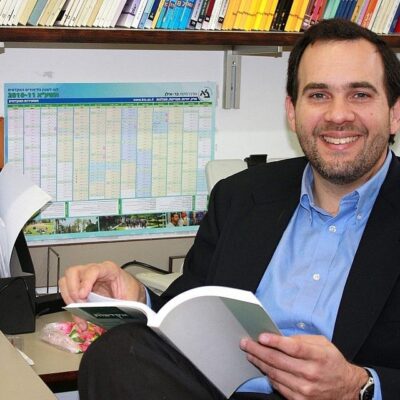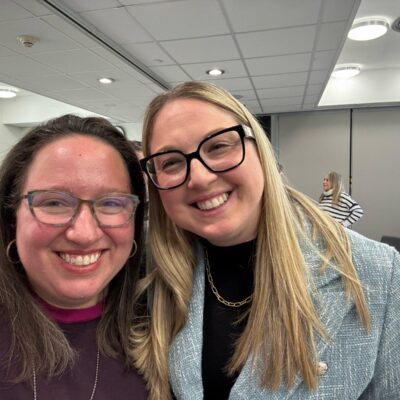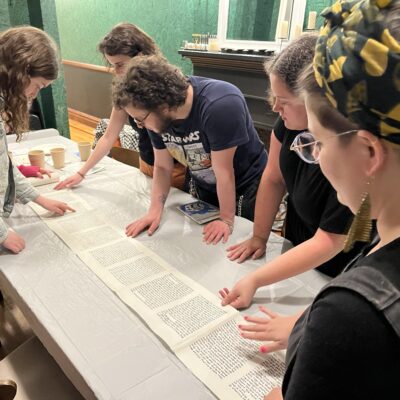Opinion
CAMPUS SCENE
Piercing the solitude of the financially insecure Jewish college student
In July, the Cohen Center for Modern Jewish Studies, in collaboration with the Jewish Foundation for Education of Women, released a report that shines a light on the ways that financial insecurity impacts the college experience of Jewish young adults in the U.S.
Drawing on both in-depth interviews and an online survey, the report’s findings are a mix of encouraging and disheartening observations. On the one hand, virtually all Jewish young adults interviewed, including those from financially insecure backgrounds, ended up attending college; in part, this is because these Jewish young adults grew up in families that treated a college education as “a given” and “non-negotiable” and found some way to make it work. That’s extraordinary, and it aligns with research by the sociologist Ilana Horwitz on the historic faith placed by the American Jewish community on education as a vehicle for economic mobility.

sebra/Adobe Stock
Illustrative. A college student working alone at night.
On the other hand, the report also reveals how Jewish students with financial need can feel isolated or invisible on campuses, even those with sizable Jewish populations. For some of these students, the need to earn money while in school and a lack of shared experiences prior to college (such as summer camps and travel experiences) can make them feel estranged from their peers as well as campus Jewish organizations intended to make them feel more at home.
During their time on campus, there are many opportunities for Jewish young adults to deepen their Jewish knowledge and their sense of connection to the wider Jewish community, as well as shape their career trajectories and commitments for after college. The findings of this report suggest that some of the Jewish young adults who would benefit the most from these opportunities may not be taking advantage of them.
This report, along with a vast literature on how to create belonging among first-generation and low-income college students, point to a series of questions that Jewish organizations can ask themselves about their program offerings in and after college to ensure they are welcoming to young people across the economic spectrum.
Do your campus offerings take working students into consideration?
As is true for financially insecure students in general, the report found that Jewish students from financially insecure backgrounds missed out on important campus opportunities because of their need to work; almost half of those from the most financially insecure families reported that they worked over 20 hours per week during the school year (which research finds is also associated with lower academic performance). For financially insecure college students who must work long hours to pay their own way, even a “free” program can come with an economic cost. Unless they are offered a stipend to offset the time they would be spending working, some students may not be able to afford to take advantage of valuable but time-intensive programs. In planning one-off campus events and sustained engagements, program organizers should ask themselves: Would a student working 15-20 hours a week be able to participate in this event? What adjustments would help to make their involvement possible?
Are you offering paid internships?
Internships are an important way for college students to gain valuable work experience and are associated with economic success after college, but the report found that the most financially insecure Jewish students were the least likely to hold internships, in part because of their demanding work schedules and inability to afford unpaid opportunities. Jewish organizations seeking to develop the next generation of professionals would be wise to offer paid internships and recruit from schools that serve a high proportion of Pell-eligible Jewish students (e.g. the CUNY system in New York, Cal State in California, community colleges). Philanthropies seeking to support these efforts could subsidize internship salaries or build programs like the Collegiate Leadership Internship Program at NYU’s Bronfman Center.
How is your organization promoting basic needs support on campus?
While reports of extreme poverty were rare among the Jewish students interviewed for this study, there were still respondents who expressed difficulty meeting basic needs. Hillel International has done much over the past five years to enhance the services it offers (e.g. food pantries, social workers). But organizations like Hillel need to ensure that students are aware that this support exists and do not feel ashamed or stigmatized when they seek it. Across the United States, one of the most significant factors that impedes use of basic needs resources by students of all backgrounds is lack of awareness. Organizations like the Hope Center at Temple University offer a wealth of information and resources on how to structure basic needs programs to increase usage.
Are you recruiting from campuses known for serving financially insecure college students?
Hillel’s database of college campuses is a natural place to identify schools with large Jewish student populations and recruit from them for programs, trips, training programs and jobs. Looking at the top ten campuses with the highest Jewish student populations, four stand out as also serving high percentages of Pell eligible students: Brooklyn College, CUNY; Queens College, CUNY; Queensborough Community College, CUNY; and Rockland Community College, SUNY. What might be the impact if Jewish leadership programs prioritized recruiting from campuses like these? How might the voices of these students shape Jewish organizational life in years to come?
Looking ahead
In 2025, higher education is facing an unprecedented period of financial instability, with shifting demographics and federal funding cuts leading many universities to consider dramatic changes to stay afloat. These changes are likely to put even more pressure on those Jewish students for whom attending college was already a financial stretch. Moving forward, Jewish organizations should think even harder about how to better serve a group of students whose challenges are likely to only increase in the coming years. Doing so will increase these young adults’ sense of belonging, both on campus and within the Jewish community as a whole.
Rona Sheramy is executive director of the Jewish Foundation for Education of Women.
Graham Wright is an associate research scientist at the Cohen Center for Modern Jewish Studies at Brandeis University and a co-author of the report “Financial Insecurity and College Success Among Jewish Young Adults.”

 Add EJP on Google
Add EJP on Google









